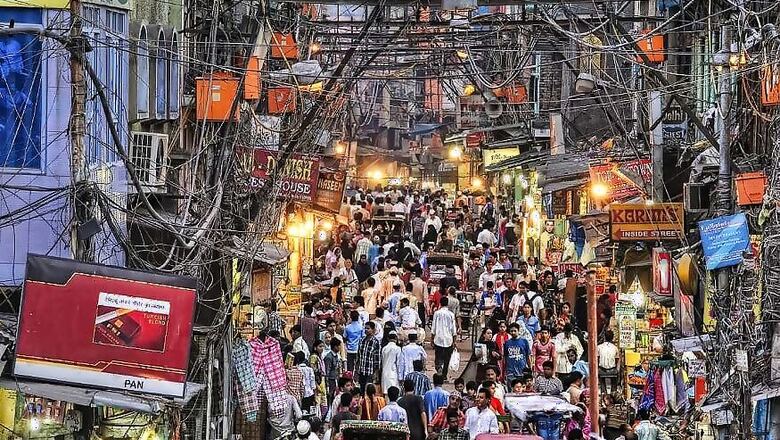
views
New Delhi: The Chandni Chowk constituency, considered to be Delhi's 'gold', is also one of the most historically important constituencies of India. The parliamentary constituency, which has witnessed a dominance of the Congress since its formation, will see a clash between two veterans this time.
Contesting for the seat is the four-time Lok Sabha MP from Delhi, Jai Prakash Aggarwal, who is pitted against veteran BJP leader and sitting MP Harsh Vardhan. Debutant Pankaj Gupta of the Aam Aadmi Party will make this a triangular fight.
Till 2008, Chandni Chowk used to be the smallest parliamentary constituency in the country in terms of area. It only housed assembly segments in the Old Delhi area falling in the Delhi government’s central district namely, Chandni Chowk, Ballimaran, Matia Mahal, Ajmeri Gate and Paharganj. Today, the Walled City comprises 30% of the entire constituency.
The areas in the constituency are densely populated and typically crowded with narrow walkways. In 2008, when a delimitation exercise was undertaken, other north Delhi neighbourhoods such as Model Town, Tri Nagar, Wazirpur, Shalimar Bagh and Shakur Basti were added.
Planned areas such as Civil Lines, Delhi University and government colonies in Timarpur comprise around 25 percent of the constituency. Unauthorised colonies like Adarsh Nagar and Jahangirpuri and slum clusters such as Shakur Basti and Inderlok account for another 25 percent to 30 percent of the area.
Further, almost 18 percent of the population in Chandni Chowk is constituted by merchants, businessmen and Vaishyas. The constituency also has a sizeable Muslim population that is mostly concentrated in the Old City.
In this cramped up constituency, the traders, along with the high-caste Brahmins are traditionally known to vote for the BJP, while the Muslim community is known to favour the Congress. Besides, civic issues have always remained burning before the polls.
Javed, 28, who hails from Uttar Pradesh, runs the famous Qureshi Kebab corner. He complains that the roads that are already congested have been further narrowed down after the Municipal Corporation opened a parking space at one side of the lane that connects the Metro station with the mosque.
Most of the people that News18.com spoke to complained that BJP’s sitting MP and Union Minister Harsh Vardhan has neither visited the constituency nor developed the area. Residents also claim that the Congress had worked more. “Congress’ Kapil Sibal used to walk around often and check on people,” a local resident said.
When asked about the reason behind Sibal’s defeat, Javed responded, “It happened in the Modi wave.”
In the past, the seat used to be a Congress stronghold, but the BJP wrested it in the last general elections. In 2014, Vardhan had defeated AAP’s journalist-turned-politician Ashutosh by over one lakh votes while Sibal finished at third. The AAP has fielded a newcomer Pankaj Gupta, a software professional, who is contesting an election for the first time.
Sixty-year-old Shaukat, a barber who runs a salon shop in one of the narrow lanes of the Jama Masjid, said he would vote for the two-term MP Jai Prakash Agarwal “only to get the Congress back in power”.
Praising the AAP government’s work on government schools and hospitals, most of the residents of the area suggest that even the police must come under the Delhi government. “People do not understand what the state subjects are. For any criminal wrongdoing, people still hold the Delhi government accountable. What’s the point if we can’t question who we elect,” asked Shahrukh, a 23-year-old engineer and a migrant from Uttar Pradesh.
While traders’ woes dominate the discussion, affordable housing, parking and jobs are key for residential areas in other parts of the Chandni Chowk constituency such as Model Town, Pitampura, Mukherjee Nagar and Shalimar Bagh. In Adarsh Nagar, Jahangirpuri and Shakur Basti that mainly comprise the unauthorised colonies and ‘jhuggi-jhopri’ clusters, basic facilities such as piped water supply, sewerage and proper roads, remain the key issues.
In a stark contrast to Chandi Chowk and Old Delhi areas, other parts of the constituency have a different story to tell. And that’s where the issue of regional identity runs deep.
As one enters Asia’s largest fruit and vegetable wholesale market in Azadpur, something that is immediately noticeable is that the place and the people are always on the move. The Mandi which works 24x7 was busy even when the mercury average was over 40 degrees and the majority of labourers and loaders working here are Purvanchalis.
While Purvanchalis may appear to be a potential and crucial vote-bank, very few of them have voting rights Delhi.
Rakesh, a shop owner from Himachal Pradesh, said, “while most of the workers in the Mandi are from Uttar Pradesh and Bihar, very few of them actually live in their own houses and only those who do, have voting rights.”
Another shop-owner said that only the Purvanchalis who have bought places in nearby slums have voting rights and that again doesn’t mean they tend to vote in one direction. Identity politics, the shop-owner says, hardly matters now as the voter has become smart.
Not more than 500-600 metres away from the Azadpur market is Lal Bagh. Majority of the people living in this slum are also Purvanchalis and either work in the Mandi or nearby factories. Here too, people seem to be favouring the BJP on PM Modi’s face value and not the candidate.
Suryabali (36) runs a shop in the locality and has been living in Delhi for at least the last 20 years. He belongs to Azamgarh in Uttar Pradesh and had left his hometown in search of work when he was 11-years-old.
“It’s about Modi here, the community factor doesn’t actually come into play as most of the poor people will vote for the BJP, it’s only the rich and elite who faced problems under Modi government, will vote against him,” said Suryabali.
In Suryabali’s response, the nationalism narrative also found resonance when he said that the security situation has improved under Modi.


















Comments
0 comment